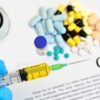With its seemingly endless bounty of irresistible dishes, Thanksgiving is undoubtedly one of the tastiest holidays of all. Unfortunately, that can also make it one of the most painful if you overdo it and end up with that dreaded burning sensation in your chest. Heartburn is a symptom of acid reflux, which occurs when the esophagus malfunctions and causes stomach acid to flow into it — and that’s when that fiery feeling sets in. Understandably, the idea of abstaining from all those once-a-year goodies may sound like a form of torture, so how can you have your cake and eat it too?
Though there are several types of medications on the market to treat the condition, some have been linked with serious negative health effects. For example, a study just released this month found that people taking a type of heartburn medication called a proton pump inhibitor – specifically ones with the brand names Prilosec, Protonix, Nexium and Prevacid – had a 21% increase in the risk of suffering a stroke. And this summer, the FDA issued a warning about antacid heartburn meds that contain aspirin, like Alka-Seltzer Original, after receiving numerous reports of consumers being hospitalized with stomach bleeding after taking them.
But don’t let these warnings spook you into doing nothing. Even if you can stand the discomfort, it’s best to seek relief because unchecked heartburn can damage your esophagus. With Turkey Day – and all the yummy treats that come along with it – rapidly approaching, we called on experts to bring you some simple, natural fixes to keep in mind during the holidays or any time. However, if you experience heartburn more than twice a week, you could have GERD (gastroesophageal reflux disease) and should see your doc to be safe.
Prevention first. Before planning for remedies, remember that common saying: Prevention is better than a cure. Fortunately, there are some super-simple steps you can take to help prevent heartburn in the first place.
“First and foremost, not eating late at night is key to decreasing nighttime heartburn symptoms. People should try to not eat within 3 hours of going to sleep,” advises Philip O. Katz, MD, FACG, a clinical professor of medicine at the Sidney Kimmel School of Medicine at Thomas Jefferson University, and chief of gastroenterology and nutrition at Einstein Medical Center in Philadelphia. Other tips: Try to avoid lying down right after eating, eat smaller meals, and eat and drink more slowly. Take closer to 30 minutes to finish your meal rather than 5 or 10 minutes.
Keep your head up. “Some people find a benefit to elevating the head of the bed either by using a 6-inch bed block or a commercial wedge” that goes under the mattress, says Dr. Katz. “It is important to create a 30-degree angle so the shoulders and head are elevated above the waist to allow gravity to aid in the clearance of refluxed acid.”
A study published in 2012 in the Journal of Gastroenterology and Hepatology showed that elevating the head in this way reduced symptoms and improved sleep in patients with acid reflux. There is no need to sleep in a chair or recliner to achieve this, and sleeping on extra pillows typically does not have the same effect. “In fact, it causes a posture change that might increase pressure on the stomach and work against you,” notes Dr. Katz.
Drink up. Let your beverage pull double duty. Dr. Katz suggests drinking a glass of room-temperature water to help clear reflux from the esophagus: “Tepid or warm water tends to relax the esophagus and may increase the speed of symptom relief,” he says. If you want to jazz it up a bit, chamomile tea can help too, particularly in the evening. It may relieve stress, which can lead to improved sleep and decreased nighttime heartburn.
Ginger tea also helps to ease inflammation and improve digestion, according to Taz Bhatia, MD, an integrative health expert and medical director at the Atlanta Center for Holistic and Integrative Medicine. She suggests cutting up a teaspoon of fresh ginger and boiling it in a cup of water. You can add honey to taste if desired. Calcium eases heartburn, too, she says, so another option is a 4-ounce glass of warm milk with a teaspoon of coconut oil, which also aids digestion and calms inflammation.
Pop a piece of gum. “Chewing gum increases the amount of saliva produced, which may neutralize the acidic material refluxed into the esophagus,” explains Dr. Katz. It can also cause more frequent swallowing and clear out the acid from the esophagus more quickly. In a study published in the Journal of Dental Research, scientists at King’s College London found that chewing gum for 30 minutes after a meal reduced reflux in participants who typically suffered from it after eating.
But be aware that “many of the sugar-free products contain sorbitol, which may increase gas and perhaps cause diarrhea if used in excess,” Dr. Katz cautions. If you think this might be an issue for you, be sure to check labels and avoid brands of chewing gum –- and other products, like sugar-free drinks –- that contain sorbitol.
Do be bitter. Substances with a bitter taste are known to ease digestion, and apple cider vinegar fits the bill. “This is a time-tested heartburn remedy that naturally provides lots of great bacteria and enzymes that break down and digest foods,” says Dr. Bhatia. Dr. Katz adds that many patients find that apple cider vinegar improves their digestion by helping to maintain an appropriate acidic pH level in the stomach.
Dr. Bhatia recommends diluting a tablespoon of the sour-bitter brew in 3 to 4 tablespoons of water after eating. “Aloe vera juice also helps heal an irritated gut lining, so this a holiday must to ease heartburn and an overworked digestive system.” She advises taking an ounce of the soothing stuff once or twice daily with meals during the holiday season to prevent heartburn. Baking soda also neutralizes excess stomach acid, she notes, so stir a teaspoon into a glass of warm water and drink a few times daily.







